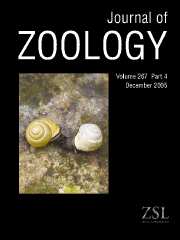Crossref Citations
This article has been cited by the following publications. This list is generated based on data provided by
Crossref.
ROBINSON, C. T.
TOCKNER, K.
and
WARD, J. V.
2002.
The fauna of dynamic riverine landscapes.
Freshwater Biology,
Vol. 47,
Issue. 4,
p.
661.
Yamaguchi, Nobuyuki
and
Macdonald, David W.
2003.
THE BURDEN OF CO-OCCUPANCY: INTRASPECIFIC RESOURCE COMPETITION AND SPACING PATTERNS IN AMERICAN MINK, MUSTELA VISON.
Journal of Mammalogy,
Vol. 84,
Issue. 4,
p.
1341.
White, Piran C.L.
McClean, Colin J.
and
Woodroffe, Gordon L.
2003.
Factors affecting the success of an otter (Lutra lutra) reinforcement programme, as identified by post-translocation monitoring.
Biological Conservation,
Vol. 112,
Issue. 3,
p.
363.
Yamaguchi, Nobuyuki
Sarno, Ronald J.
Johnson, Warren E.
O'Brien, Stephen J.
and
Macdonald, David W.
2004.
MULTIPLE PATERNITY AND REPRODUCTIVE TACTICS OF FREE-RANGING AMERICAN MINKS, MUSTELA VISON.
Journal of Mammalogy,
Vol. 85,
Issue. 3,
p.
432.
Bonesi, Laura
and
W. Macdonald, David
2004.
Differential habitat use promotes sustainable coexistence between the specialist otter and the generalist mink.
Oikos,
Vol. 106,
Issue. 3,
p.
509.
Somers, Michael J.
and
Nel, Jan A. J.
2004.
Habitat selection by the Cape clawless otter (Aonyx capensis) in rivers in the Western Cape Province, South Africa.
African Journal of Ecology,
Vol. 42,
Issue. 4,
p.
298.
Horst, Dan van der
and
Gimona, Alessandro
2005.
Where new farm woodlands support biodiversity action plans: a spatial multi-criteria analysis.
Biological Conservation,
Vol. 123,
Issue. 4,
p.
421.
Bonesi, Laura
Strachan, Rob
and
Macdonald, David W.
2006.
Why are there fewer signs of mink in England? Considering multiple hypotheses.
Biological Conservation,
Vol. 130,
Issue. 2,
p.
268.
Nel, Jan A. J.
and
Somers, Michael J.
2007.
Distribution and habitat choice of Cape clawless otters, in South Africa.
South African Journal of Wildlife Research,
Vol. 37,
Issue. 1,
p.
61.
LeBlanc, F.A.
Gallant, D.
Vasseur, L.
and
Léger, L.
2007.
Unequal summer use of beaver ponds by river otters: influence of beaver activity, pond size, and vegetation cover.
Canadian Journal of Zoology,
Vol. 85,
Issue. 7,
p.
774.
Gallant, Daniel
Vasseur, Liette
and
Bérubé, Céline H.
2008.
Evaluating bridge survey ability to detect river otter Lontra canadensis presence: a comparative study.
Wildlife Biology,
Vol. 14,
Issue. 1,
p.
61.
Galliez, Maron
de Souza Leite, Melina
Queiroz, Thiago Lopes
and
dos Santos Fernandez, Fernando Antonio
2009.
Ecology of the Water Opossum Chironectes minimus in Atlantic Forest Streams of Southeastern Brazil.
Journal of Mammalogy,
Vol. 90,
Issue. 1,
p.
93.
Cho, Hee-Sun
Choi, Kwang-Hee
Lee, Sang-Don
and
Park, Young-Seuk
2009.
Characterizing habitat preference of Eurasian river otter (Lutra lutra) in streams using a self-organizing map.
Limnology,
Vol. 10,
Issue. 3,
p.
203.
Ruiz-Olmo, Jordi
and
Jiménez, Juan
2009.
Diet diversity and breeding of top predators are determined by habitat stability and structure: a case study with the Eurasian otter (Lutra lutra L.).
European Journal of Wildlife Research,
Vol. 55,
Issue. 2,
p.
133.
Kean, Eleanor F.
Müller, Carsten T.
and
Chadwick, Elizabeth A.
2011.
Otter Scent Signals Age, Sex, and Reproductive Status.
Chemical Senses,
Vol. 36,
Issue. 6,
p.
555.
Quaglietta, Lorenzo
Martins, Bruno Herlander
de Jongh, Addy
Mira, António
Boitani, Luigi
and
Clarke, Rohan H.
2012.
A Low-Cost GPS GSM/GPRS Telemetry System: Performance in Stationary Field Tests and Preliminary Data on Wild Otters (Lutra lutra).
PLoS ONE,
Vol. 7,
Issue. 1,
p.
e29235.
Prakash, Nisarg
Mudappa, Divya
Raman, T. R. Shankar
and
Kumar, Ajith
2012.
Conservation of the Asian Small-Clawed Otter (Aonyx Cinereus) in Human-Modified Landscapes, Western Ghats, India.
Tropical Conservation Science,
Vol. 5,
Issue. 1,
p.
67.
Matos, Ana Cristina
Figueira, Luis
Martins, Maria Helena
Matos, Manuela
Álvares, Sofia
Pinto, Maria Lurdes
and
Coelho, Ana Cláudia
2013.
DISSEMINATEDMYCOBACTERIUM AVIUMSUBSP.PARATUBERCULOSISINFECTION IN TWO WILD EURASIAN OTTERS (LUTRA LUTRAL.) FROM PORTUGAL.
Journal of Zoo and Wildlife Medicine,
Vol. 44,
Issue. 1,
p.
193.
Melero, Y.
Palazón, S.
Gosàlbez, J.
Martelo, J.
and
Bonesi, L.
2013.
Is the standard Eurasian otter Lutra lutra survey strategy suitable for surveying the American mink Neovison vison?.
Acta Theriologica,
Vol. 58,
Issue. 2,
p.
169.
Hysaj, Etleva
Bego, Ferdinand
Prigioni, Claudio
and
Balestrieri, Alessandro
2013.
Distribution and marking intensity of the Eurasian otter,Lutra lutra, on the River Drinos (southern Albania).
Folia Zoologica,
Vol. 62,
Issue. 2,
p.
115.


